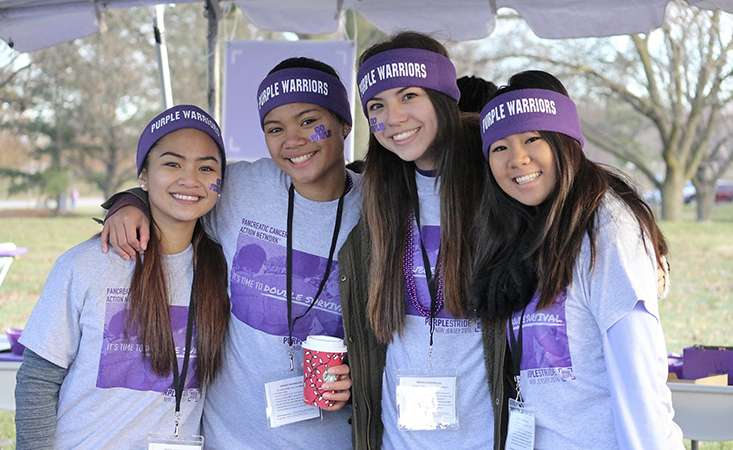
Finding a support group (online or in person) can be very helpful for a teen who has a sick parent.
Editor’s note: Originally published on World Mental Health Day 2021, this blog post was updated in May 2023.
Everyone remembers their teen years – the good, the bad and the embarrassing. Being a teen is hard. Being a teen with a parent, guardian or grandparent who has pancreatic cancer is harder.
To get more information about the state of mental health for teens and resources to help, PanCAN spoke with Cheryl Karp Eskin, MA, MFT, senior director at Teen Line a program of Didi Hirsch Mental Health Services, an anonymous, peer-to-peer hotline for teenagers. She is also co-chair of the Los Angeles Suicide Prevention Network.
“Teens are really struggling right now,” Eskin said. “Even before the pandemic hit, we were seeing an increase in rates of depression, anxiety and suicidal thinking among teens. I worry that the pandemic has exacerbated these increases.”
And, if there’s a parent, guardian or family member with pancreatic cancer in the mix, the usual stressors and anxieties of being a teenager only increase.
Eskin offers insight into this world.
“Teens often feel that they are the only ones going through something and no one else gets it. It can also be really isolating being in more of a caretaker role for a parent. Teens might not feel comfortable talking with their peers about what is going on at home, or peers even seeing their parent if there are dramatic physical changes,” Eskin said.
“Finding a support group (online or in person) can be very helpful for a teen who has a sick parent. Make sure they have someone to talk to about what is going on and how it’s affecting them. It’s hard to care about school when you have a sick parent. Or easy to be angry at how unfair the world can be.”
Much of that advice applies to teens who have already lost a loved one, but Eskin also emphasizes the importance of recognizing emotions.
“Teens should be educated about the stages of grief and how they might feel different day to day and even moment to moment. Figuring out ways to keep memories alive is helpful if a family member has passed away, as is learning that it’s okay to still laugh and smile.”
Holidays, graduations, weddings and more are difficult to imagine without certain people in attendance. Eskin suggests keeping memories alive may ease the pain of facing important milestones down the line.
“Wearing their clothing or jewelry, hanging pictures and talking about them on a regular basis can help in the healing process. Get creative about the ways you integrate them into these special days. Some examples could be making it an annual tradition to eat at their favorite restaurant for their birthday, visiting their gravesite with family and writing letters to them can be therapeutic for people.”
Eskin points to PanCAN PurpleStride as a great example of a healthy outlet.
“This is an event where roughly everyone there has been affected by pancreatic cancer in some way. What a wonderful way for teenagers to meet peers their own age who have gone through the same experience.”
What signs should a parent or guardian look for if they think their child is depressed? Eskin says warning signs include changes over time in appearance, sleeping/eating habits, motivation, grades and social engagement.
“Also, pay attention if your teen is making comments about feeling hopeless, crying or having angry outbursts. For example, a kid who used to be very engaged in lots of clubs and activities who is now isolating in their room – take note of that.”
Most importantly, says Eskin, is to “trust your gut – you know your kid best.”
If a parent or guardian suspects their child is depressed, Eskin suggests starting with something simple: talking.
“Talk to your child openly and honestly – without judgment – about concrete things you’ve noticed and express your concern. Offer support or help them talk to a professional or another trusted adult. If they are talking about suicide or not wanting to be here anymore, take it seriously and get help.
“Schools, hotlines like Teen Line and pediatricians are all great resources.”





